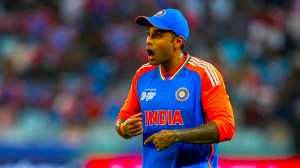‘India can provide leadership because we have science, qualification and regulatory support for traditional medicine’
'To help GCTM visualise WHO’s vision, there is an advisory group of scientists and experts, representing all regions (of WHO). This advisory group has chartered the goals and functions of GCTM.'
 Secretary (AYUSH) Rajesh Kotecha
Secretary (AYUSH) Rajesh Kotecha Secretary (AYUSH) Rajesh Kotecha speaks to Sohini Ghosh on the sidelines of WHO Traditional Medicine Summit in Gandhinagar on the idea behind the summit and its impact.
In the over one year since the ground-breaking ceremony of WHO’s Global Centre for Traditional Medicine (GCTM) at Jamnagar, what has been the development so far?
To help GCTM visualise WHO’s vision, there is an advisory group of scientists and experts, representing all regions (of WHO). This advisory group has chartered the goals and functions of GCTM. Like there is a vertical for global survey on traditional medicine, there is a vertical for data governance and a vertical for optimising human resources in traditional medicine. For each of these verticals, charters have been established, like a roadmap. On the logistics side, an interim office has been established at Jamnagar, and we have started construction of the main building. Advertisements have been issued for seven key director-level positions, and we are in the final stage of recruitment for these positions.
What was the idea behind the WHO Traditional Medicine Summit this year after the Global Ayush Investment and Innovation Summit (GAIIS) last year?
This conference is a follow up of PM’s discussion with the DG (director general of WHO Dr Tedros Adhanom Ghebreyesus when they met in Jamnagar last April)… the PM had suggested that WHO should think about a global summit for traditional medicine once every two years, beginning with India. This is the first time WHO is organising such a large scale summit on traditional medicine and it will now happen every two years in every region of WHO. GAIIS was a ministry of Ayush event.
While GCTM is aimed as being a knowledge centre for global practices of traditional medicine, why are Indian traditional medicine practices at the forefront?
It is because the centre is situated in India and our media has been focusing on AYUSH only but it is a global traditional medicine centre, representing all regions. AYUSH is getting a better push but we are taking this opportunity to prove that we, India, are the leaders and can provide the leadership because we have the science, the qualification and regulatory support (for traditional medicine)… all these are available in India, not elsewhere.
What kind of international interest has GCTM received?
We have received interest from all over the world. We have formed an informal group called ‘group of friends of traditional medicine’ in Geneva (in May) for coordination and we got immediate support from over 27 countries. The Union government has pledged financial and other support to GCTM for the next 10 years… other countries, too, are providing support in the form of human resources and their expertise, among others.







